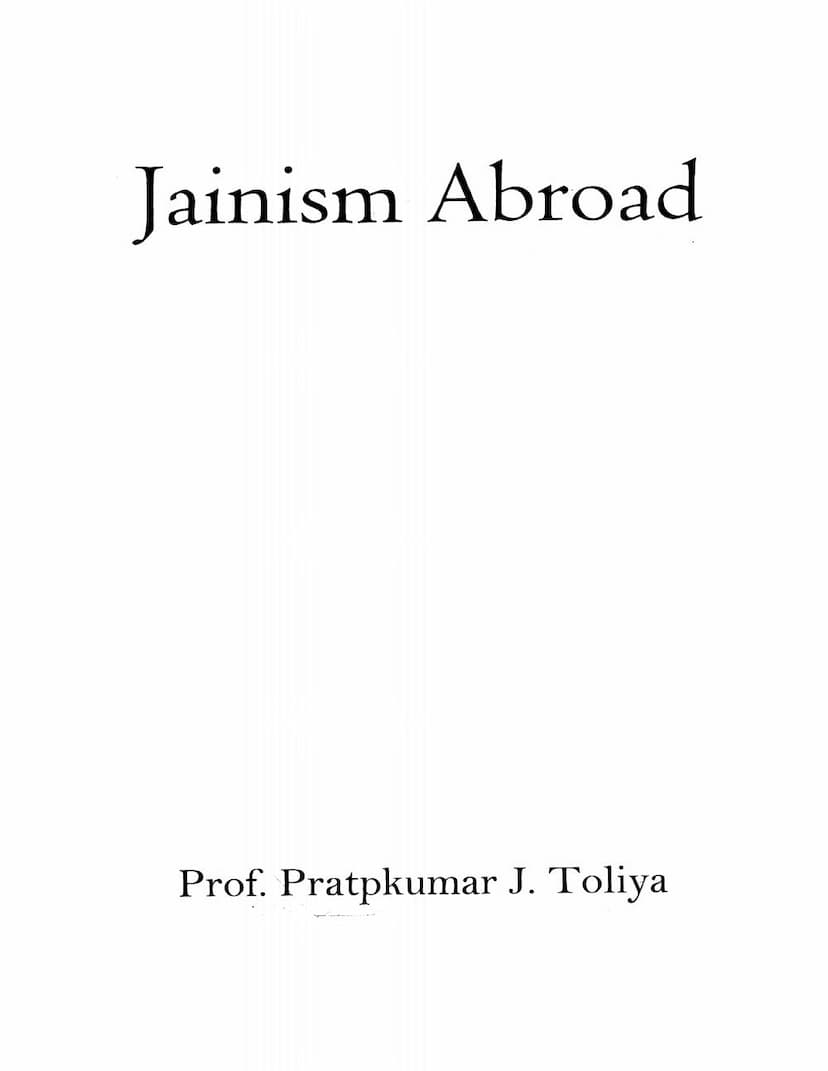Jainism Abroad
Added to library: September 2, 2025
Loading image...

Summary
This document is the book "Jainism Abroad" by Prof. Pratapkumar J. Toliya, published by Vardhaman Bharati International Foundation. It chronicles the author's extensive efforts and experiences in propagating Jainism internationally through a unique "three-fold performance" of talks, music, and meditation.
Key Themes and Content:
- Author's Mission: Prof. Toliya is dedicated to spreading the teachings of Jainism worldwide, seeing it as a timely and relevant philosophy for modern times. He emphasizes its scientific, philosophical, and practical aspects, particularly its emphasis on non-violence (Ahimsa), manifold perspectives (Anekantavada), and self-knowledge (Atma-Jnana).
- Three-Fold Performances: This unique approach involves:
- Talks/Speeches: Delving into the mythological, historical, philosophical, and practical aspects of Jainism, often tailored to specific audiences and venues like international conferences, seminars, radio shows, and public meetings.
- Jain Music: Utilizing vocal and instrumental music, often featuring the Sitar, to convey spiritual messages and enhance meditation. He has produced numerous LPs and cassettes of Jain devotional music.
- Meditation: Guiding participants through meditation techniques rooted in Jain philosophy, aiming for self-realization and inner peace.
- International Tours and Engagements: The book details his numerous tours, particularly in the USA, starting with his participation in the First International Jain Conference at the UN Plaza in 1981. It includes reports, news clippings, interviews, and personal reflections from these engagements in various cities like Cleveland, Detroit, Danbury, New York, etc.
- Key Figures and Inspirations:
- Srimad Rajchandraji: Prof. Toliya deeply reveres Srimad Rajchandraji as his "Paramguru" and spiritual guide, citing his profound influence on Mahatma Gandhi and his inspirational literature, such as "Atma Siddhi Shastra."
- Sri Sahajanandaghana Maharaj: The book includes a biographical sketch of this influential Jaina monk, founder of the Srimad Rajchandra Ashram, highlighting his spiritual journey and teachings.
- Mahatma Gandhi: Prof. Toliya draws parallels and acknowledges Gandhi's deep connection to Jain principles, particularly Ahimsa, influenced by Srimad Rajchandraji.
- Other Esteemed Figures: Mentions of scholars like Dr. Pandit Sukhlalji and spiritual figures like Mataji Dhandeviji underscore the author's lineage of inspiration.
- Core Jain Principles Highlighted:
- Ahimsa (Non-violence): Emphasized as the paramount principle, extending to thought, word, and deed, and even "non-violent food" and ethical production of clothing.
- Anekantavada (Non-absolutism/Manifold Perspectives): Presented as a crucial tool for understanding different viewpoints and resolving conflicts, thus promoting peace.
- Atma-Jnana (Self-Knowledge) and Self-Realization: The ultimate goal of Jainism, achieved through meditation, right faith, right knowledge, and right conduct.
- Renunciation and Detachment: The importance of detachment from worldly possessions and attachments for spiritual progress, exemplified by the lives of Tirthankaras.
- Karma Theory: Explained as the accumulation of actions (mental, verbal, physical) and its impact on one's life and rebirths. The Jain perspective is detailed, differentiating it from other philosophies.
- Abandoning Night-Eatings: A significant practical principle discussed in detail, based on scientific, hygienic, and spiritual reasoning, with personal anecdotes and the story of Rohan illustrating its importance.
- Challenges and Gratitude: Prof. Toliya acknowledges the limitations of resources and his physical frame but is driven by his mission. He expresses gratitude to his masters, supporters, and the Jain community, while also noting the need for greater material support for his extensive work.
- Life of Bhagawan Mahaveera: A significant portion of the book is dedicated to a detailed account of the life, teachings, renunciation, and enlightenment of Bhagawan Mahaveera, tracing his journey from Prince Vardhamana to the ultimate Tirthankara.
- Virchand Raghavji Gandhi: An essay by his late daughter, Parul P. Toliya, introduces Virchandji as the first modern exponent of Jainism abroad, highlighting his role at the Parliament of Religions in Chicago (1893) and his scholarly contributions.
- Contemporary Relevance: Prof. Toliya consistently links Jain principles to modern issues, advocating for the integration of science with non-violence to prevent global disaster and promote universal welfare.
In essence, "Jainism Abroad" is a testament to Prof. Pratapkumar J. Toliya's lifelong commitment to sharing the profound wisdom and practices of Jainism with the world, emphasizing its universal appeal and relevance for spiritual growth and global peace.